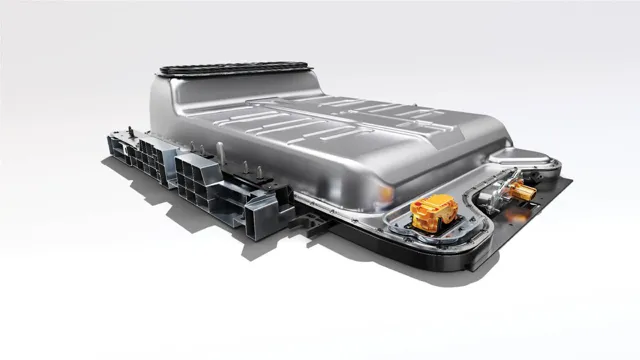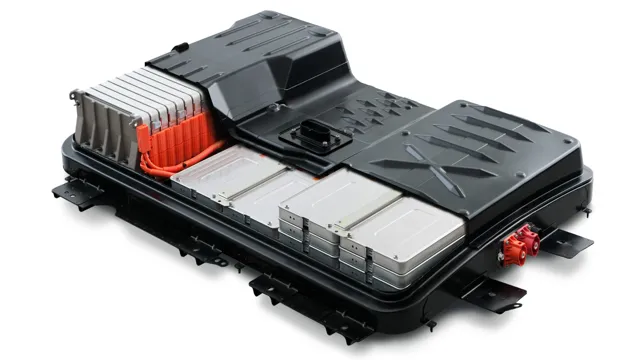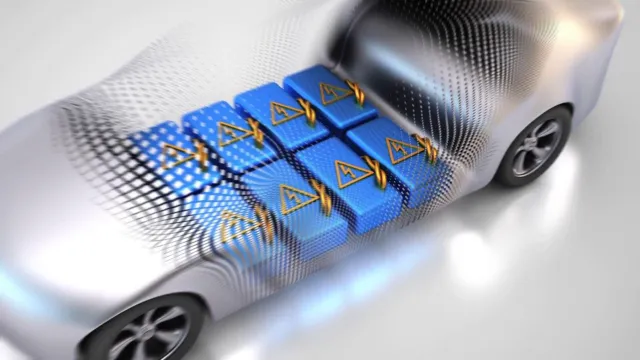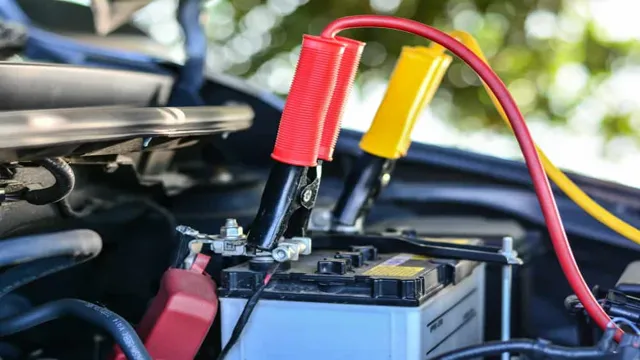Revolutionizing the Road: The Advancements and Benefits of an Electric Car Battery
The constant evolution of technology has brought about improvements in almost every aspect of life, and the automotive industry is no exception. The future of car batteries is a hot topic, and for good reason. As electric cars become increasingly popular, there is a need for batteries that are more efficient, have a longer lifespan, and are capable of powering cars for longer distances.
So, what does the future hold for car batteries? Will we see innovative changes that revolutionize the industry or will we stick to current technology? In this blog, we will explore the latest developments and take a glimpse into what the future may hold for car batteries.
Benefits of Electric Car Batteries
An electric car battery is the power source that allows electric cars to move without using fossil fuels. There are numerous benefits to using electric car batteries, such as their environmentally friendly nature. Electric car batteries emit zero emissions, helping to reduce air pollution and limit the adverse effects of climate change.
Additionally, these batteries are significantly more efficient than traditional gasoline engines, allowing drivers to travel farther on a single charge. Moreover, electric car batteries have lower maintenance costs and are less complicated than conventional engines, providing more significant cost savings in the long run. These batteries also have a longer lifespan than traditional car engines, reducing waste and contributing to a more sustainable future.
With advances in technology, electric car batteries are becoming more efficient, smaller, and lighter, ensuring that electric cars will become more commonplace soon.
Eco-Friendly
Electric Car Batteries Electric car batteries come with a number of benefits that make them a popular choice for eco-conscious individuals. One of the biggest advantages is their low environmental impact. Unlike traditional gasoline-powered cars, electric cars produce zero emissions, making them a much cleaner option for transportation.
Additionally, electric car batteries are much quieter than traditional engines, which means they help reduce noise pollution. Another benefit of electric car batteries is their efficiency. Unlike gasoline engines, which can waste up to 60% of fuel energy as heat, electric car batteries have a much higher efficiency rate, meaning they require less energy to charge and operate.
This translates into lower fuel costs and less dependency on fossil fuels. Finally, electric car batteries are becoming increasingly affordable, making them a viable option for budget-conscious consumers. With more and more options available on the market, the benefits of electric car batteries will only continue to grow.

Reduced Maintenance Costs
When it comes to electric cars, one benefit that often goes overlooked is the reduced maintenance costs associated with the battery. Unlike traditional gas-powered cars, electric cars rely on a rechargeable battery to power the vehicle, which means there are fewer mechanical parts that need regular maintenance or replacement. This can save owners significant amounts of money in the long run, as they won’t have to worry about expensive repairs or routine maintenance like oil changes.
Plus, since electric cars don’t rely on internal combustion engines, there’s no need for costly engine tuning or emissions testing. Overall, the reduced maintenance costs are just one more reason why electric cars are becoming an increasingly popular choice for eco-conscious drivers looking to save money in the long run.
Lower Fuel Costs
Lower fuel costs are one of the most prominent benefits of electric car batteries. When compared to traditional fuel-powered vehicles, electric cars have lower fuel costs over the long term. The reason for this is that electric vehicles rely on their rechargeable batteries to power their engines, while traditional cars require gasoline or diesel to function.
With electricity prices often much lower than gasoline prices, recharging an electric car battery can cost relatively little. In addition, electric cars have regenerative braking systems that capture energy typically lost during braking and convert it into electricity, helping to reduce overall energy usage and costs. Overall, electric car batteries offer the double benefit of lower fuel costs and reduced environmental impact, making them a more sustainable choice for many drivers.
Challenges with Electric Car Batteries
An electric car battery is a major component in the operation of an electric vehicle. However, there are a number of challenges associated with these batteries. One major challenge is the issue of range anxiety, which refers to the fear of running out of battery power before reaching the destination.
This can be a major barrier to wider adoption of electric cars. Additionally, electric car batteries can be quite expensive and their performance can degrade over time, which means that owners may need to replace them more frequently than they would like. Another challenge is the issue of recycling.
Batteries are made up of a variety of materials, some of which can be toxic, and recycling them can be difficult and costly. Nonetheless, advances in technology are helping to address these issues and make electric cars a more viable option for consumers. As the demand for electric cars continues to grow, it is likely that we will see even more innovation in the field of electric car batteries in the years to come.
Limited Driving Range
Electric car batteries have come a long way in recent years, but one major challenge still exists: limited driving range. While some electric cars can go around 250-300 miles on a single charge, others may only last around 100 miles. This can be a problem for people who need to make longer journeys or who live in areas without many charging stations.
It also means that drivers need to carefully plan out their trips and be mindful of their remaining battery life. However, there are ways to mitigate this issue, such as investing in a car with a longer range or using public charging stations when on the road. As technology continues to advance, it’s possible that we may see even more efficient electric car batteries in the future, helping to solve this challenge once and for all.
High Initial Cost
One of the biggest challenges with electric cars is the high initial cost of their batteries. While electric cars have the potential to save drivers money in the long run with lower fuel and maintenance costs, the cost of purchasing the car itself can be daunting. This is largely due to the expensive battery technology that powers the car.
However, as demand for electric cars increases, the cost of battery production is expected to fall, making electric cars more accessible to the average consumer. Additionally, some governments offer incentives and tax credits to encourage the adoption of electric cars, which can help offset the higher initial cost. Overall, while the upfront cost of electric cars can be a barrier for some buyers, the potential long-term savings and environmental benefits make them an attractive option for many.
Long Charging Time
One of the challenges faced by electric car owners is the long charging time of their batteries. This can be particularly frustrating when you need to travel long distances and have to stop frequently to recharge. While modern electric cars are equipped with faster chargers, the technology still has some catching up to do before it can match the speed and convenience of a traditional gasoline car.
The main reason for the long charging time is the capacity of the battery, which is still limited even in the best electric vehicles on the market. To put it in perspective, think of a battery as a water tank. The bigger the tank, the longer it takes to fill up with water.
The same is true with electric car batteries. Manufacturers are working hard to improve battery capacity and reduce charging time, but until that happens, electric car owners will need to plan ahead and be patient when it comes to charging their vehicles.
Advancements in Electric Car Battery Technology
As more and more people turn to electric vehicles (EVs) as a cleaner, more sustainable mode of transportation, advancements in electric car battery technology are rapidly being developed. An electric car battery is the heart of any EV, storing the energy that powers the vehicle’s electric motor. In recent years, there has been a surge of innovation happening in the battery industry that promises to make EVs more practical and affordable than ever before.
One of the most promising developments is in solid-state batteries which use a solid electrolyte instead of the liquid one used in current lithium-ion batteries. This technology could potentially double the energy density of batteries, which means vehicles could travel twice as far on a single charge. Additionally, advancements in battery management systems (BMS) are also happening, which would optimize the use of the battery by tracking energy use and adjusting the battery’s charge and discharge rates accordingly.
With these developments, the electric car battery technology is quickly moving towards an exciting future.
Improved Energy Density
Electric car battery technology has come a long way, and one of the significant advancements is improved energy density. It means that the new batteries can store more energy within the same amount of space. With increased energy density, electric vehicles can drive further without needing to be charged again.
It is a game-changer for the electric car industry that can attract more potential buyers, especially those who are concerned about the car’s range. It is made possible by the development of new materials, such as lithium-ion batteries, that have better energy storage capabilities. An electric car with high energy density batteries can provide a more extended range, faster acceleration, and better performance than those with lower energy density batteries.
So if you’re an electric car lover, you can choose a vehicle with high-energy density batteries for a better driving experience.
Quicker Charging Times
Electric car battery technology has come a long way in recent years, with advancements leading to quicker charging times. This is a game-changer for electric car enthusiasts, as it means less time spent waiting for the battery to charge up. In the past, charging an electric car could take several hours, but now, thanks to more efficient batteries, charging times have been significantly reduced.
As a result, electric cars are becoming a more practical choice for everyday use, as drivers no longer need to worry about running out of power mid-journey. This is a significant step forward for the electric car industry, and as technology continues to improve, we can expect even more exciting developments in the future. So, if you’re considering an electric car, now is the perfect time to take the plunge and enjoy all the benefits that these innovative vehicles have to offer.
Conclusion: Investing in Electric Car Batteries
In conclusion, an electric car battery is the heart and soul of any electric vehicle. It is the proverbial gas tank of the future, powering cars without polluting the environment. It’s like having a gym membership, except the only thing getting stronger is the battery life.
So, while most cars may stop at gas stations, electric cars just need a recharge. So go ahead, turn the key and feel the power of the green revolution in your hands.”
FAQs
What is an electric car battery?
An electric car battery is a type of rechargeable battery that powers electric vehicles.
How long does an electric car battery last?
The lifespan of an electric car battery can vary, but most batteries last between 8 and 10 years before needing replacement.
Can an electric car battery be recycled?
Yes, electric car batteries can be recycled to recover valuable materials like lithium, cobalt, and nickel.
How does cold weather affect an electric car battery?
Cold weather can reduce the range and performance of an electric car battery, as well as increase the time it takes to charge the battery.






